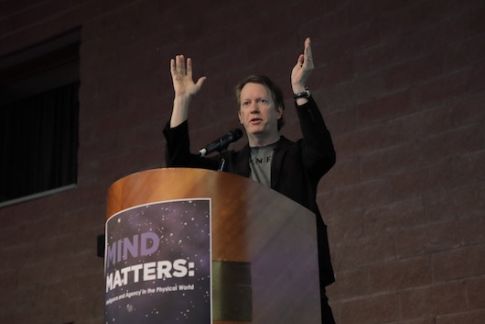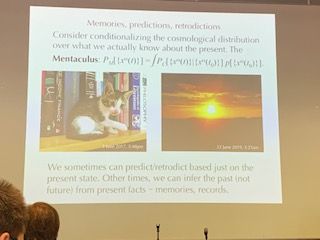
FQXi's 6th International meeting is now over -- and we have plenty of brilliant talks and panel discussions from the conference to now share with you.
The first session was on causality, and Caltech cosmologist Sean Carroll opened the meeting with a round-up of his search for a mathematical description of why causes happen before effects. Our reporter Kate Becker has already written a wonderful summary of his ideas in her article, "First Things First: The Physics of Causality," so I will point you there in the first instance.
In his talk, Carroll gave a more technical discussion of the problem of the arrow of time. The underlying microscopic laws of physics have no arrow: processes are just as likely to happen forwards or backwards. Yet, on the macroscale, we clearly experience time's arrow pointing from the past to the future. Where does this asymmetry come from?

The arrow of time is usually attributed to the law of thermodynamics that says that entropy always increases. Handily, the universe started in a low entropy state, although exactly why is a bit of a mystery.
Carroll's strategy is to distinguish between the "microvariables" and "macrovariables" of a system, when considering thermodynamics and entropy. For the Earth, say, the microvariables would be all the particles contained within the planet, while its macrovariables -- used to calculate the Earth's motion -- would be far more limited, to just the position and velocity of its centre of mass. Macrovariables, he argues, reach equilibrium slowly, while microvariables equilibriate fast. Could this somehow be the key?
Another issue that isn't discussed as much concerns the difference between having a memory of the past versus calculating what happened by some other means. Carroll's example is his own recollection of his cat Ariel's hijinks, compared with his ability to work out the motion of planets long ago. He proposes that this is related to how the macrovariables themselves evolve. Sometimes the macrovariables evolve deterministically -- allowing you to make calculations and predict what will happen and retrodict what has happened. But sometimes the macrovariables evolve stochastically, which means you can only assign probabilities to what will happen. It's in the latter case, as you can hear him arguing in his talk, that you assign a memory.
July 30, 2019
Causality, Memory and the Arrow of Time. Cosmologist Sean Carroll is searching for a mathematical description of why causes precede effects and asking what makes our memories of the past special. Audio of a talk from the FQXi meeting in Tuscany.
Full Podcast